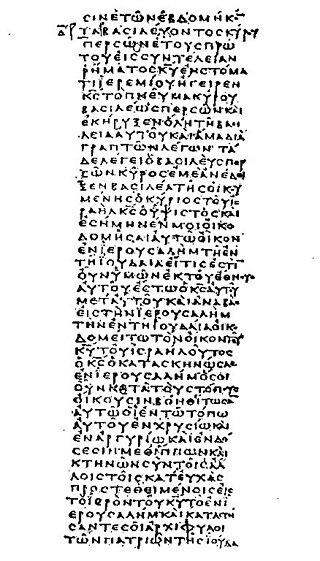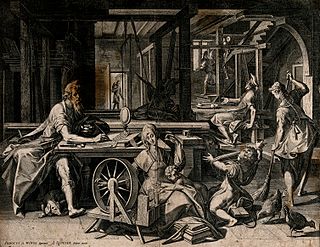Related Research Articles

Justin Martyr, also known as Justin the Philosopher, was an early Christian apologist and philosopher.

The Septuagint, sometimes referred to as the Greek Old Testament or The Translation of the Seventy, and often abbreviated as LXX, is the earliest extant Greek translation of the Hebrew Bible from the original Hebrew. The full Greek title derives from the story recorded in the Letter of Aristeas to Philocrates that "the laws of the Jews" were translated into the Greek language at the request of Ptolemy II Philadelphus by seventy-two Hebrew translators—six from each of the Twelve Tribes of Israel.

Priscilla and Aquila were a first century Christian missionary married couple described in the New Testament. Aquila is traditionally listed among the Seventy Disciples. They lived, worked, and traveled with the Apostle Paul, who described them as his "fellow workers in Christ Jesus".
Clementine literature is the name given to the religious romance or "novel" which purports to contain a record made by one Clement of discourses involving the Apostle Peter, together with an account of the circumstances under which Clement came to be Peter's travelling companion, and of other details of Clement's family history. The author is sometimes called Pseudo-Clement.
The Testament of Solomon is a pseudepigraphical composite text ascribed to King Solomon but not regarded as canonical scripture by Jews or Christian groups. It was written in the Greek language, based on precedents dating back to the early 1st millennium AD, but was likely not completed in any meaningful textual sense until sometime in the Middle Ages. In its most noteworthy recensions, the text describes how Solomon was enabled to build his temple by commanding demons by means of a magical ring that was entrusted to him by the archangel Michael.
The archiepiscopal see of Caesarea in Palaestina, also known as Caesarea Maritima, is now a metropolitan see of the Eastern Orthodox Patriarchate of Jerusalem and also a titular see of the Catholic Church. It was one of the earliest Christian bishoprics, and was a metropolitan see at the time of the First Council of Nicaea, but was later subjected to the Patriarchate of Jerusalem. The city remained largely Christian until the Crusades, its bishop maintaining close ties to the Byzantine Empire. After the establishment of the Kingdom of Jerusalem by the crusaders, the see was transformed into a Latin archdiocese, subordinate to the Latin patriarch of Jerusalem.
Aquilaof Sinope was a translator of the Hebrew Bible into Greek, a proselyte, and disciple of Rabbi Akiva.

Frederick Cornwallis Conybeare, was a British orientalist, Fellow of University College, Oxford, and Professor of Theology at the University of Oxford.

Seeing Islam As Others Saw It: A Survey and Evaluation of Christian, Jewish and Zoroastrian Writings on Early Islam from the Studies in Late Antiquity and Early Islam series is a book by scholar of the Middle East Robert G. Hoyland.

The Acts of the Apostles is a genre of early Christian literature, recounting the lives and works of the apostles of Jesus. The Acts are important for many reasons, one of them being the concept of apostolic succession. They also provide insight into the valuation of "missionary activities among the exotic races," since some of them feature missionary work done among, for instance, the Cynocephaly.
In the myth and folklore of the Near East and Europe, Abyzou is the name of a female demon. Abyzou was blamed for miscarriages and infant mortality and was said to be motivated by envy, as she herself was infertile. In the Coptic Egypt she is identified with Alabasandria, and in Byzantine culture with Gylou, but in various texts surviving from the syncretic magical practice of antiquity and the Early Middle Ages, she is said to have many or virtually innumerable names.

The Dialogue with Trypho, along with the First and Second Apologies, is a second-century Christian apologetic text, usually agreed to be dated in between AD 155-160. It is seen as documenting the attempts by theologian Justin Martyr to show that Christianity is the new law for all men, and to prove from Scripture that Jesus is the Messiah.
Early Christianity, otherwise called the Early Church or Paleo-Christianity, describes the historical era of the Christian religion up to the First Council of Nicaea in 325. Christianity spread from the Levant, across the Roman Empire, and beyond. Originally, this progression was closely connected to already established Jewish centers in the Holy Land and the Jewish diaspora throughout the Eastern Mediterranean. The first followers of Christianity were Jews who had converted to the faith, i.e. Jewish Christians. Early Christianity contains the Apostolic Age and is followed by, and substantially overlaps with, the Patristic era.
Jewish polemics and apologetics in the Middle Ages were texts written to protect and dissuade Jewish communities from conversion to Christianity, or more rarely to Islam. The terms polemics and apologetics may be distinguished but may also be considered somewhat subjective. A smaller number of proselytizing text also exists intended to convert Christians, or more rarely Muslims, to Judaism. However, the vast majority of Jewish polemical literature was written in response to Christian polemical writings and with a permanent reference to Christian arguments.
The Dialogue of Jason and Papiscus is a lost early Christian text in Greek describing the dialogue of a converted Jew, Jason, and an Alexandrian Jew, Papiscus. The text is first mentioned, critically, in the True Account of the anti-Christian writer Celsus, and therefore would have been contemporary with the surviving, and much more famous, Dialogue between the convert from paganism Justin Martyr and Trypho the Jew.
The Dialogue of Timothy and Aquila is a Greek Christian text giving a dialogue, akin to that of Dialogue with Trypho, between Timothy, a Christian, and Aquila, a Jew. The text was earlier thought to date to 200 CE, however recent studies assign a later date, as late as the 6th century.
The Dialogue of Simon and Theophilus is a 5th-century Latin Christian text giving a dialogue, akin to that of Dialogue with Trypho, between Simon, a Jew, and Theophilus, a Christian. The Altercatio is the oldest surviving Jewish-Christian dialogue preserved in Latin. It has been attributed to, and may even be by, Cyprian. The work draws on earlier Greek and Latin traditions.

Acts 18 is the eighteenth chapter of the Acts of the Apostles in the New Testament of the Christian Bible. It records the final part of the second missionary journey of Paul, together with Silas and Timothy, and the beginning of the third missionary journey. The book containing this chapter is anonymous, but early Christian tradition uniformly affirmed that Luke composed this book as well as the Gospel of Luke.
William C. Varner is an American biblical scholar. He is Professor of Biblical Studies & Greek at The Master's University.
The Historia Acephala is an anonymous 4th or early 5th century ecclesiastical chronicle primarily concerning the Patriarchate of Alexandria and the activities of Athanasius. Despite the poor condition of the manuscript it has survived in, the work is valuable for its exceptional chronological accuracy.:p. 21:p. 495 f.
References
- ↑ William Varner, Ancient Jewish-Christian dialogues: Athanasius and Zacchaeus, Simon and Theophilus, Timothy and Aquila: introductions, texts, and translations E. Mellen Press, 2004 "This work provides the texts and translations of three ancient Jewish-Christian dialogues: The Dialogue of Athanasius and Zacchaeus (Greek, 4th c.); The Dialogue of Simon and Theophilus (Latin, 5th c.); and The Dialogue of Timothy and Aquila (Greek, 6th c.). This is the first published translation of each of these texts. An introduction discusses the context of these dialogues in the "Contra Judaeos" literature of the early church and also explores the question of whether or not they"
- ↑ Ancient Jewish and Christian perceptions of crucifixion Page 250 David W. Chapman - 2008 "Certainly, Athanasius and Zacchaeus must be used with caution since some have suggested that it was really a work of missionary catechism (and not an account of actual dialogue). Even Varner (Dialogues, 17-19), who is otherwise quite ..and Christian encounter being represented in the dialogue tradition (ibid., 286-88), follows Andrist in this regard.."
- ↑ F. C. Conybeare The Dialogues of Athanasius and Zacchaeus and of Timothy and Aquila, Oxford. 1898. 45. Ibid.. p. xxxiv.
- ↑ Sébastien Morlet La "démonstration évangélique" d'Eusèbe de Césarée 2009 "Dans le même temps, FC Conybeare se fit lui aussi le défenseur de l'hypothèse «Jason et Papiscus ». En 1898, il suggéra que le Dialogue de Timothée et Aquila et le Dialogue d'Athanase et Zacchée étaient deux recensions différentes d'un "